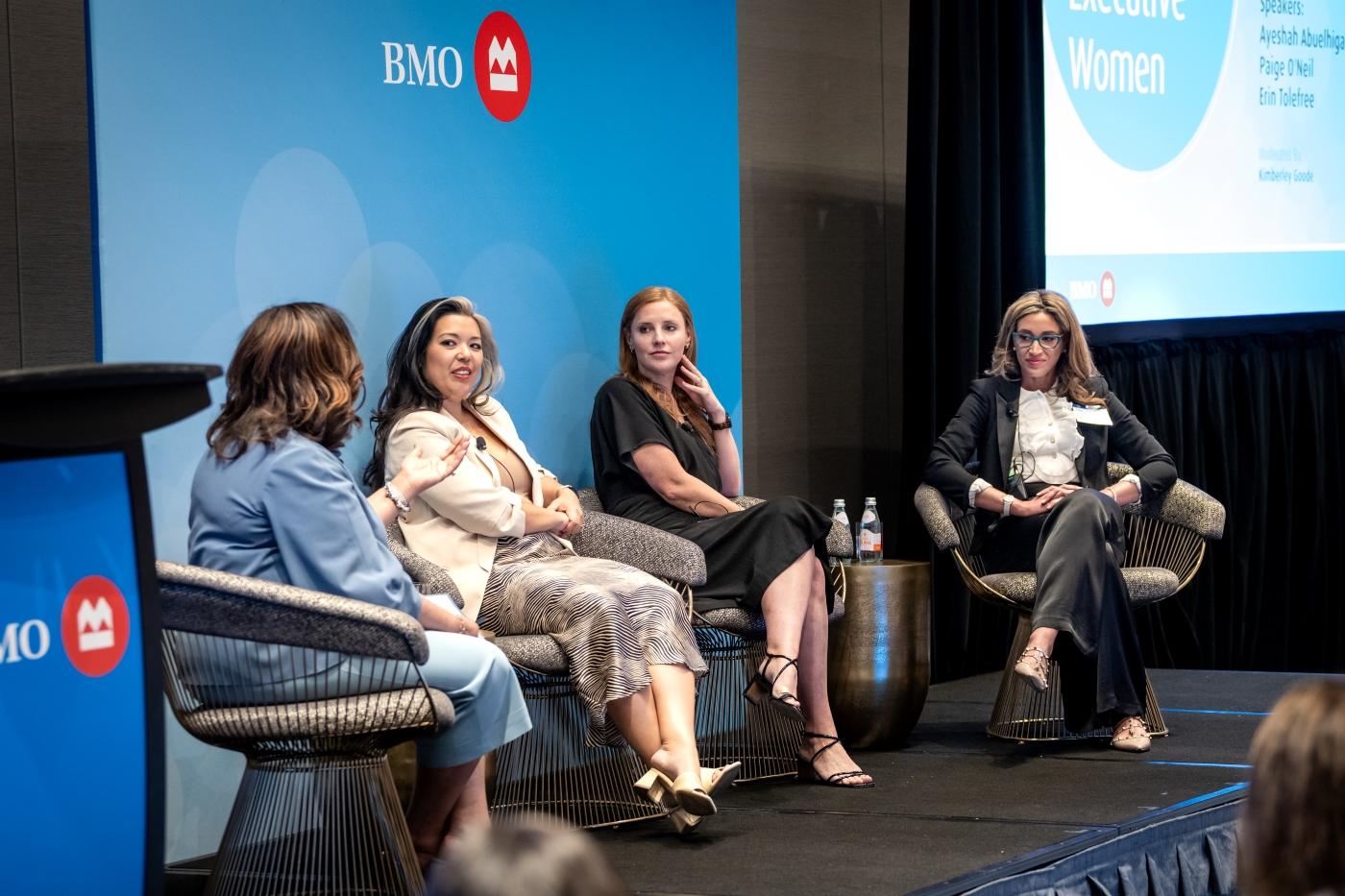Brand building can be a powerful way for women business leaders to create new commercial opportunities and growth, but there is no one-size-fits-all approach.
That was one of the main takeaways of a panel discussion between three senior business leaders during the 10th BMO Forum for Executive Women in Chicago. The panel featured:
Ayeshah Abuelhiga, Founder and CEO, Mason Dixie Foods
Paige O'Neil, President, Shapack Partners
Erin Tolefree, President and CEO, Baldwin Richardson Foods.
According to the most recent Women in the Workplace report from McKinsey and LeanIn.org, the share of women in the U.S. and Canada with C-suite roles has risen to an all-time high since 2015. However, it’s still relatively small, at 28%. In this context, strengthening personal and corporate brand recognition could be a way for women business leaders to stand out in a competitive marketplace.
Brand authenticity
Mason Dixie Foods has seen significant growth in the past several years. The key for Founder and CEO Ayeshah Abuelhiga has been authentically and organically fostering an emotional connection between her customers, her company’s products, and corporate brand.
"You build a brand slowly through trust, through quality, owning up to your mistakes, creating better things and continuing to advance," she said.
Abuelhiga says her company spends a relatively small amount on marketing at a time when some consumer-focused companies pour investment into advertising and social media influencers. However, she said her company has a highly engaged audience on social media because of its brand authenticity.
"We have a really engaged base because we don't go out there and try to get it."
Brand distinctiveness
Branding has often been low on the list of priorities in the commercial real estate industry. But Shapack Partners’ President Paige O’Neil explained that her company considers branding in a different way—nearly every project they develop needs to have a strong brand of its own.
“The brands we create are organic and start from ground zero every single time,” O’Neil said.
“It is each individual building and how that is branded both from convincing our investors and lenders to come into the project so that it can even happen and then developing the brand as we build it so we can fill it with occupants.”
Indeed, O’Neil described a unique example of a distinctive office building her company developed, whose brand took on a life of its own. The building featured a full-size basketball court on the top floor of a 17-story complex in Chicago’s Fulton Market District. The building’s notoriety, which is often tagged on social media, has attracted sports and entertainment celebrities, as well as headliners such as President Barack Obama.

Brand values
As President and CEO of Baldwin Richardson Foods, Erin Tolefree leads what started as an ice cream parlor in the 1920s and eventually, through three generations, has become one of the largest Black family-owned and operated businesses in the U.S.
She described a set of brand values that have come to define her company. Each successive generation has maintained those values but also added its own signature to how they are communicated and realized, ensuring the family legacy stays current with the times. Tolefree described her role as building from previous generations, enabling her to focus on accelerating growth and developing her own leadership style.
“For us, we have that same value system but we call it C.A.R.E. in our business,” Tolefree said. “It’s a modernization of what is a winning recipe and a secret sauce to how our business continues to grow.” She explained that the C stands for collaboration, A is for agility, R is for results, and E stands for empowered.
Personal brand
Brand building doesn’t only refer to corporate brands. The panel also discussed the importance of women business leaders fostering their personal brands in their companies and communities. This is crucial not only for career growth but also so that other women rising through the ranks or considering the direction of their own professions see what’s possible.
As a leader in her company, Tolefree from Baldwin Richardson Foods said it is important for her to live out the brand’s values consistently at work, home, and in her community. Achieving this level of harmony brings a level of authenticity that enables her to do her best work, she said.
“C.A.R.E is an acronym, but it is really representative of the way that I want to operate as a person whether that’s professionally or at home as a mom or a wife in my personal life,” Tolefree said.
O’Neil from Shapack Partners has discovered that her own leadership brand is about listening and providing a perspective that considers the views of others, rather than being the center of attention all the time. This realization is particularly important in the real estate industry where driving success includes bringing external stakeholders to the table.
“What I need to do more of, I’ve realized, is listen so that my brand can be that I’m not the loudest in the room but that I’m the most thoughtful.”
Similarly, Abuelhiga from Mason Dixie Foods has found that to be effective, her leadership brand has evolved to be more focused on her team rather than herself. The more she cheered her team on and spotlighted their accomplishments, the more people wanted to join her team.
“There’s no me, there’s no success without the incredible efforts that my team puts in,” she said. “A lot of what I do is just holler when someone has done a great job and make sure that everyone who follows me knows that.”
